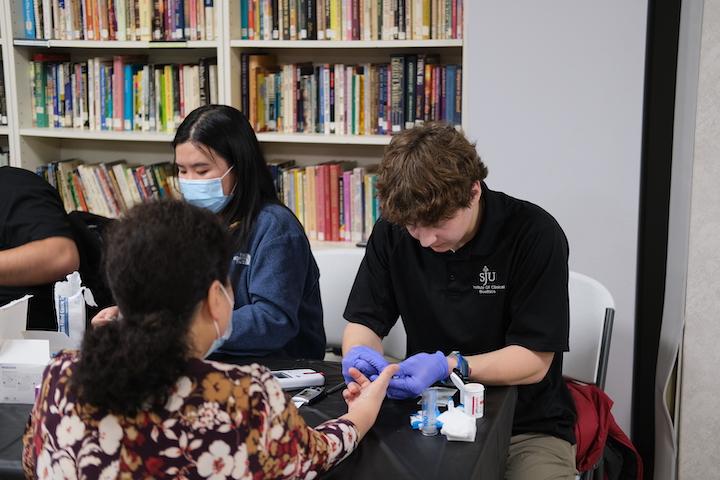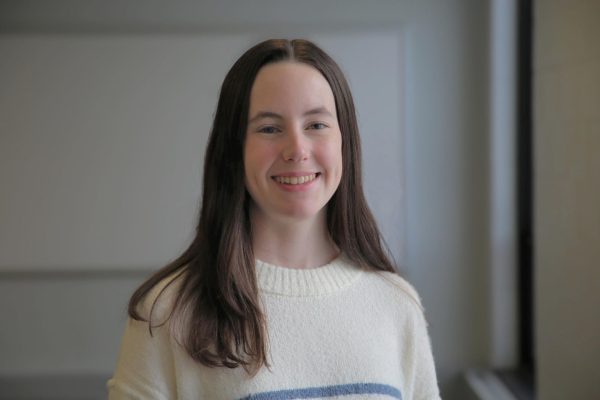The Institute of Clinical Bioethics (ICB) launched its Chinese Health Promoter program at the Chinese Christian Church and Center (CCC+C) in Chinatown Feb. 19. The program provides free medical care and supplies to any member of the community who comes in.
The program is one of four ICB health promoter programs. The first was set up in 2010 for immigrants from Africa, and was followed by a program for Hispanic immigrants in 2015. A mobile unit that travels to rural areas for members of the Hispanic community was started
this semester.
The Chinese Health Promoter program served about 85 patients, according to Jun Huh, ’23, one of the student coordinators of the program. Huh is completing his pre-health science post Baccalaureate Certificate to prepare for his upcoming MCAT entrance exam.
“As a first-generation Korean who came to [the United States] at a young age, it’s really hard to find Asian groups that come into the States well-off,” Huh said. “We don’t really get our citizenship right away. We don’t get our health insurance. It’s really a privilege to get healthcare, and it’s really hard for immigrant Asians to accept a very expensive form of healthcare.”
Each of the four programs runs once a month and includes stations to provide various forms of medical care, including general measurements like blood sugar and height, dental care, physical and occupational therapy and other screenings. All of these services are free of charge and run by 15-20 St. Joe’s student volunteers, medical students and medical residents.
Services at the Chinatown clinic are provided by 15 St. Joe’s students, as well as medical and dental students from other area universities, three medical residents from Mercy Fitzgerald Hospital and St. Joe’s professors of occupational and physical therapy. They also have translators to facilitate communication between patients and clinic staff.
Huh was one of four student coordinators of the Chinatown program, along with Andren Chen ’26, Aidan Fogarty ’25 and Isabella Stefanic ’24. As research fellows at the ICB, they organize the program with the help of Peter Clark ’75, S.J., Ph.D., professor of theology and director of the ICB.
A major focus of all the health promoter programs is on helping undocumented immigrant populations who may struggle to access or afford medical care.
“We’re giving students the opportunity to put [Jesuit values] into action. So if we really do care about the vulnerable, we’re dealing with undocumented Africans, undocumented Hispanics, undocumented Asians,” Clark said. “There’s no other university running clinics like this, so we’re really putting the Jesuit tradition and values into action.”
Chen pitched the idea of opening a clinic in Chinatown after he joined the ICB and saw how the other programs were helping their respective communities. Chen said he wanted to bring that aid to Philadelphia’s Asian community too.
“In the Asian community, we tend to be very close to each other,” Chen said. “We tend to go for Asian doctors that we are familiar with, that speak the same language. So I think us doing this health promoter [program] not only will help them, but also make us be more open in a way.”
As a member of the CCC+C, Chen coordinated efforts between the ICB and his church for the program.
“We brought the idea to my church, and they agreed to continue with this project,” Chen said.“But then we not only wanted to focus on the members of the church, we also wanted to reach out to the community outside of Chinatown. First we advertised to the church and then the members of the church would go out and advertise it to the other communities beyond the church.”
The clinics start out in churches because that is where members of immigrant communities feel safe and are easier to access than hospitals or other medical offices, according to Clark.
Clark said the students’ work in setting up the Chinese Health Promoter has been “remarkable.”
“They’re being humble,” Clark said. “They’ve created bins for every station. They have 30 days worth of prenatal vitamins and children’s vitamins and adult vitamins. They’re putting dental kits together. Yesterday, Aidan and Steven [Silver, research and development coordinator of the ICB] were putting a dental chair together. I’ve never seen a more coordinated effort by students.”
A patient who attended said clinic staff were kind and helpful.
“Going to the hospital is really difficult, especially when you could just come to church on Sunday and just walk right over here,” the patient said through a translator. “It is very convenient.”
The clinic lasted four hours, and some stations, like the dental station, were in particularly high demand. When asked about anything the clinic could do to improve, patients said they wished the clinic could be offered every week.
“We’d love to come back,” a patient said after she had been through the clinic. “The more, the better.”
Jed Liu, a first-year student at Temple University, served as a translator.














































